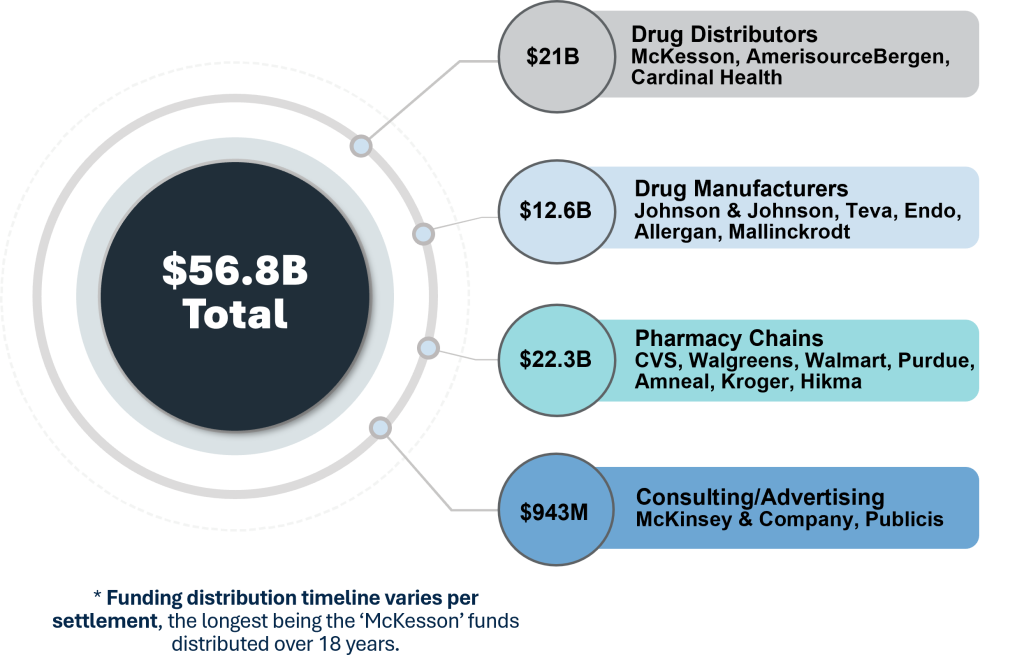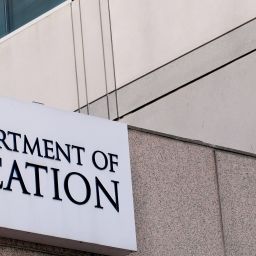A practical guide for nonprofits navigating state-level opioid settlement grants.
If your nonprofit serves people and families most affected by the opioid crisis—those living with addiction, in recovery, or supporting loved ones through it—or provides addiction prevention services, we’re here to help you learn more about the opioid settlements and how to access the funds. With states and local governments distributing billions of dollars, nonprofits like yours can turn that funding into life-saving change for the people you serve.
What are the Opioid Abatement Settlements?
Opioid abatement funds are the result of legal settlements with opioid manufacturers, distributors, and retailers. These funds are intended to remediate the harm caused by the opioid crisis, through prevention, treatment, recovery, and support services.
Our previous blog post provides a comprehensive background on the national opioid settlements.
Each participating state has developed a process for distributing funds, such as through advisory councils or local governments. These fund administrators manage the settlement funds, determine the regional distributions, ensure compliance with the settlement agreement, and create and run grant programs. Nonprofits are eligible to apply for these grant programs in nearly every state.
Resources to learn more:
- The National Association of Counties provides data and maps to show how each state’s funding is distributed.
- The National Association of Attorneys General provides the history of how state attorneys general led the fight for these settlements.

How to Pursue Available Opioid Abatement Funding for Your Nonprofit
Understand Your State’s Process and Priorities
Visit your state’s opioid settlement website and review the Opioid Settlement Guides for each state developed by the Vital Strategies Overdose Prevention Program and OpioidSettlementTracker.com. Look for:
- Funding priorities (e.g., youth prevention education, housing, harm reduction, medication-assisted treatment, workforce development)
- Application timelines (release dates and deadlines, decision dates)
- Scope (some grant programs are local/regional, while others are statewide)
If your state provides email updates on its opioid abatement fund programs, sign up. If your state’s fund administrator’s meetings are open to the public, attend or read the meeting transcripts. These are ways to learn about grant release timing and to hear your state’s decision-makers describe their grant program priorities.
Review your programs through the lens of these priorities. Questions to ask:
- Can we expand or adapt our services to address these priorities?
- Does this fit our mission?
- What does our specific community or population need?
- Do we have data/evidence to support our proposal?
- Do we have experience in delivering each of these services, or do we need an experienced partner?
Build Partnerships Early
Many states encourage or require collaboration. Consider:
- Partnering with local health departments or behavioral health providers
- Creating a coalition of regional community-based organizations
Don’t wait until grant opportunities are released; start building these relationships now. Some opioid settlement grants have short application windows, such as 30 days, which does not allow time to establish new partnerships.
Prepare a Strong Proposal
Based on previous years’ programs, fund administrators are looking for:
- Evidence-based approaches
- Partnerships
- Clear goals/objectives, outcomes, and evaluation plans
- Sustainability beyond the grant period
- Inclusion of people with lived experience in program design
Examples of Nonprofits Already Benefitting from Opioid Abatement Funding
- Texas awarded $10 million to RecoveryPeople to expand peer support workforce development statewide.
- Rhode Island distributed $1.3 million to 20 nonprofits for trauma-informed care and recovery services.
- Georgia funded Avita Community Partners with $345,856 for a men’s residential and outpatient program.
- Florida awarded Recovery Connections of Central Florida with $525,000 for mobile recovery support services.
Award sizes greatly differ from state to state. To review other previous awards, the National Academy for State Health Policy offers a State Opioid Settlement tracker.
McAllister & Quinn’s Expert Grant Services
Founded in 2004, McAllister & Quinn is a full-service government affairs and external funding consulting firm based in Washington, D.C. We specialize in helping clients navigate the complex world of competitive federal and non-federal grants, Congressionally Directed Spending requests, and large-scale government procurements, with deep expertise in strategy and proposal development.
We’ve helped our clients secure over $15 billion in funding over 20 years from competitive federal, state, and private funding sources.













